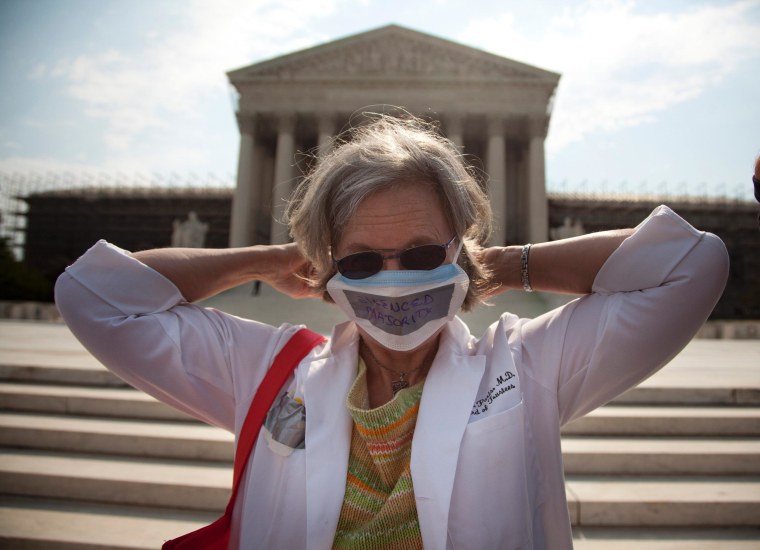Today was your day to join #TeamLyle if you hadn't already in years past, or in the recent weeks in which fingernails have bitten to the nub in anticipation of the Supreme Court decision on the Affordable Care Act. To keep up with all of it, joining #TeamLyle now is a virtual necessity. The "Lyle" in question is Lyle Denniston, who has been covering the Supreme Court for (much) longer than I've been alive. He's one of the reporters for the invaluable SCOTUSblog, and they live-blogged the Court's decisions today.
The recap: the Court issued three big rulings. First, they ruled that juvenile life sentences without parole violate the Eighth Amendment, and then flushed down Montana's earlier ruling which challenged Citizens United.
The Supreme Court has struck down key provisions of Arizona's crackdown on immigrants. But the court said Monday that one part of the law requiring police to check the status of someone they suspect is not in the United States legally could go forward. Even there, though, the justices said the provision could be subject to additional legal challenges
We'll have more on this as it develops, but to sum up: the "papers, please" provision remains intact, but is most certainly legally mortal. Even though quite a bit of her law was rule unconstitutional, Arizona governor Jan Brewer is already doing a victory lap, calling the ruling "a victory for the rule of law" -- which, funny enough, takes SB 1070 a little further: not only can police judge who might and might not be a criminal based upon their physical characteristics and behavior (ahem, skin color, cough), but even those opposed to such judgment being codified into law are themselves against the rule of law.
Much as it is for some conservatives racist to complain about racism, one is now an outlaw if he or she believes your law is unconstitutional. Which, per the judgment of the Court, much of it actually is.
You'll note that the health care reform decision is missing from that list. That'll come Thursday morning at 10am ET, likely authored by the Chief Justice himself. As such, the preview of the decision which Melissa and her guests -- The New Republic's Jonathan Cohn, NYU law professor Kenji Yoshino, TheNation.com executive editor Richard Kim, and Aisha Moodie-Mills of the Center for American Progress -- did in yesterday's show can help bring you up to speed. (See below after the jump, for video and more coverage).
Wonkblog's Sarah Kliff is fully #TeamLyle, but her comprehensive breakdown of what to expect today is a must-read, even if you're catching this after the news has broken. If you're completely lost on this and you're not in a place where you can watch our segments from yesterday, Kliff's post is a good place to start. One thing that stood out to me was her explanation of how the individual mandate in the ACA, which will likely be struck down, could survive in another form:
Yes: The Government Accountability Office has come up with nine policies that could encourage individuals to enroll in insurance coverage. Their list – which you can read here – includes ideas such as an open enrollment period, where individuals could only sign up for coverage at a certain point in the year, and more extensive outreach programs to make individuals aware of their options.The difficulty is mostly political: congressional Republicans are unlikely to permit the Obama administration to repair the Affordable Care Act. But it might not be up to them. If the mandate is overturned but the rest of the law stands, many states might go looking for policy solutions to stabilize the health-care markets that they set up under the Affordable Care Act but that are now missing the steadying influence of the mandate.
Salon political writer Steve Kornacki agrees:
But as Jonathan Chait, Kevin Drum and others have pointed out recently, the death spiral might not be as inevitable as most assume. The reason has to do with other provisions in the law that expand access to state Medicaid programs and offering subsidies to help consumers purchase private plans. This could provide for incentives that would encourage many young and healthy people to take part in the system. The example of Oregon, where 90,000 residents applied for 10,000 spots when the state decided to increase its Medicaid rolls a few years ago, suggests that carrots could be as effective as coercion for many people.If this theory is right, then the healthcare law may still be workable even without a mandate.
(I'd be remiss if I didn't also note that Kornacki is one of the four co-hosts of msnbc's brand-new The Cycle, premiering today at 3pm ET.)
Brian Beutler at Talking Points Memo has another good primer for the possible outcomes of an ACA ruling. Greg Sargent of the Plum Line blog also has a good look at what liberals are prepping for. Now that we've covered the political-junkie part of all of this, we'll take a look later in the next few days at people on the ground are feeling. Given that I've seen a lot of the health care industry's failings up close and personal recently, there will be no shortage of things to say.
Melissa's discussion on health care from yesterday's show is below.
